Henna Tattoo Safety
Black Henna and Chemical Laced
Henna (Benzene, Kerosene,
Gasoline)
Henna is NOT black. So-called "black henna" is
poison. Real, natural, SAFE henna
will always leave a stain in the brown/red family.
It will start off orange and darken up over a couple
of days to be a brown or brown/red.
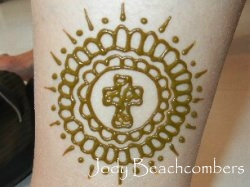 I know, I know...most pictures that you see of henna
are with the paste on the skin and it looks black.
Actually, the henna paste is a green or brown when it's wet,
but as it dries, it starts to look black (especially
in pictures). Most
pictures of henna are taken right after the henna
paste is applied
while the paste is still on the skin. I know, I know...most pictures that you see of henna
are with the paste on the skin and it looks black.
Actually, the henna paste is a green or brown when it's wet,
but as it dries, it starts to look black (especially
in pictures). Most
pictures of henna are taken right after the henna
paste is applied
while the paste is still on the skin.
The stain that safe henna leaves is NEVER black.
It's possible to get very dark nearly black stains
on the palms of the hands and the soles of the feet,
but no where else on the body can you achieve
nearly-black henna stains.
Even in these
areas, you will see a red undertone to the henna.
 Myth:
I've had black henna in the past
with no reaction so it's safe for me to continue to
get black henna. Myth:
I've had black henna in the past
with no reaction so it's safe for me to continue to
get black henna.
Truth: No, it is NOT safe! In
fact, the more you come in contact with the chemical
PPD, the more likely you are to have a reaction and
the more likely it is to be severe.
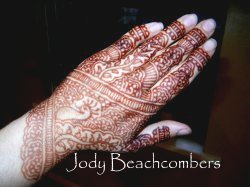
Consider
that benzene and PPD do not leave your body.
They build up in the body over time creating the
potential for very severe internal issues in the
liver and blood. Benzene is a known carcinogen
(cancer causing and cancer spreading agent).
The high rates of leukemia in Emirati women that use
adulterated henna is what prompted the EAU to ban
PPD and benzene to be added to henna.
Myth:
If the henna is brown or
red it is
automatically safe.
Truth: Natural brown henna is safe, however
there are still people that add benzene, kerosene,
gasoline, and/or brown hair dye to get darker color
quicker. Unscrupulous artists are getting
smarter, now that the dangers of "black henna" are
known to more people.
This is why it's
important to be absolutely sure, your artist
is using all natural henna. Stick with a
professional artist that mixes their own henna and
has a good reputation. Look for tip-offs such
as only needing to leave the henna on
for a short period of time, really long lasting
henna, full color immediately after paste removal, or an artist being vague about the
ingredients in their henna. If an artist doesn't
know what is in their henna or will not tell you
what's in their henna paste, do NOT get henna from
them. Henna mixes are not a secret.
Natural henna stains will always start off orange and
darken over a couple of days to a brown or brow/red
colored stain.
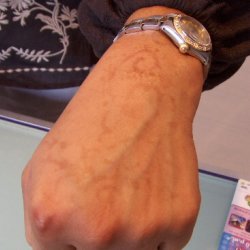 Light
Scarring from Henna Mixed with
Chemicals Light
Scarring from Henna Mixed with
Chemicals
These are pictures of a customer who was exposed to
henna mixed with benzene, kerosene, or gasoline while at
a tourist spot in Georgia. This henna tattoo was
done TEN MONTHS
before these pictures were taken.
She said the henna had a painful burning sensation while
it was on the skin. It left a nice deep brown
color though it was only left on for less than an hour.
Henna should not burn. It may feel a little itchy
on the skin as it dries
(the henna shrinks as it dries), and it may
make your skin feel cold,
but it will NOT burn.
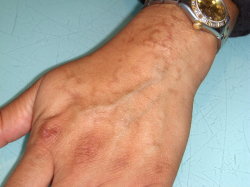 Henna
should have a natural scent and you will likely smell
the essential oils mixed in the henna. Henna
should have a natural scent and you will likely smell
the essential oils mixed in the henna.
~ It should NOT smell like chemicals.
~ It should NOT burn.
~ Any artist worth getting henna from, WILL be able to
tell you the ingredients in their henna paste.
Be Smart! Be Safe!
There aren't as may warnings or pictures of damage from
henna with additives like benzene, kerosene, and
gasoline as there are for black henna. The real
danger with these additives is that they are carcinogens
(cancer causing and cancer spreading agents), and they
build up in your blood stream and liver. They
don't just go away when your henna tattoo goes away.
The fact that they can leave a color similar to natural
henna is tricky. Look for tip-offs such as only needing to leave the henna on
for a short period of time, really long lasting
henna, full color immediately after paste removal
(henna will always start off orange and take a day or 2
to darken to full color), or an artist being vague about the
ingredients in their henna. If an artist doesn't
know what is in their henna or will not tell you
what's in their henna paste, do NOT get henna from
them. Henna mixes are not a secret. |
Myth:
Henna done by an ethnic
person or in a country
that is known for henna is
safe.
Truth: Adulterated henna is found in
every country including countries known for henna
such as India, UAE, Saudi Arabia, Morocco, Egypt, Sudan, and Dubai. In fact, many of these countries are recognizing the
severe dangers of "black henna" and adulterated
henna. Some are enacting serious laws to prevent it's use. It can still be found ANYWHERE, so it's up to you to
protect yourself from adulterated "henna".
Just because someone comes from a cultural
background that includes henna, does not mean they
are educated about henna or the dangers of
adulterated henna, anymore than someone from California knows how to surf or someone from
New York can make a great pizza.
Check the articles below to
see what others have to say about "black henna".
More Henna Safety Info From Our
Henna Help
Site...
The color of natural henna varies and can be a deep burgundy brown,
coffee brown, rich maroonish, or any shade of orange or brown. The
color of your actual henna tattoo will
depend on a number of factors
including, how fresh the henna is, how the henna is mixed, how the
skin was prepared before applying the henna, how long the moist
henna was in contact with the skin, what part of the body was
hennaed, and how the dried henna was removed.
 Natural henna is safe. I've been doing henna since 1999 and
I've never encountered an allergy to natural henna. It's
important that you only use natural henna and you know what other
ingredients are mixed with the henna. Natural henna is safe. I've been doing henna since 1999 and
I've never encountered an allergy to natural henna. It's
important that you only use natural henna and you know what other
ingredients are mixed with the henna.
Henna needs to stay on a good while (much longer than an hour) for
a deep long lasting stain. The length the stain will stay depends on
your body chemistry, how long the henna is left on, if a sealant was
used, your body temperature, and how well the henna tattoo is cared for. A typical natural henna tattoo
will last 5 days to 3 weeks.
Any "henna" that leaves a deep black stain that lasts for more
than a couple of days, contains dangerous chemicals and may not
contain henna at all.
"Black henna" containing chemicals IS dangerous.
Especially if you’ve had a black henna
tattoo in the past.
The picture below is from a
MSNBC article
on black henna. Having never used unsafe henna, I have no
pictures of my own to show you. Do a Google Images search for
Black Henna Scars if you'd like to see more of what can happen to
you.
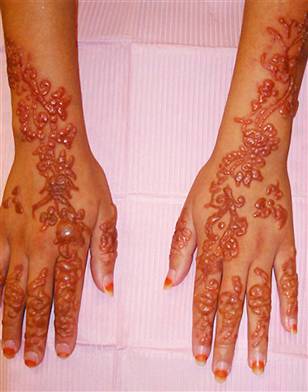 Why? So-called black henna contains a toxin called para-phenylenediamine
or PPD (coal tar) and
benzene (yes, the same benzene that is found in gasoline and
paint solvents) which seep into your bloodstream. Imagine
mixing gasoline, black dye, and coal tar then applying it to your
skin and you have black "henna". Great,
right? Why? So-called black henna contains a toxin called para-phenylenediamine
or PPD (coal tar) and
benzene (yes, the same benzene that is found in gasoline and
paint solvents) which seep into your bloodstream. Imagine
mixing gasoline, black dye, and coal tar then applying it to your
skin and you have black "henna". Great,
right?
Para-phenylenediamine (coal tar) is most often found in hair dyes. It is
legal in hair dye in the USA at 6% or less. It is illegal in
many European countries. When it used as "henna," it is
typically in concentrations of 20-70%. Think about
that. With hair dye, it's not seeping directly into your skin
for an hour and it's only at 6% or less!
The allergic
reaction that PPD can cause is similar that of an allergy to bee
stings. You may know someone who has to carry around a
life-saving syringe in case they are stung by a bee? A PPD allergy
can develop at any time once you are sensitized to para-phenylenediamine,
but may not show up for weeks, months, or even years. Every time you
come into contact with PPD, the allergy will worsen.
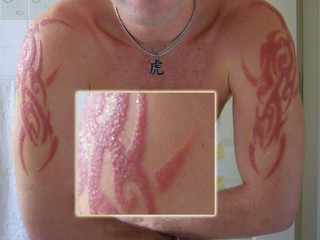 You will be
sensitized to PPD for the rest of your life. You will be
sensitized to PPD for the rest of your life.
Once
sensitized to PPD you will be cross sensitized to many other
chemicals. Once sensitized to PPD, you will never be able to
dye your hair again.
A reaction to para-phenylenediamine can include itching, a rash,
full body hives, severe blistering, severe swelling, permanent scarring, liver
damage, and life-threatening breathing problems. Progressive
exposure to PPD and benzene has been linked to leukemia and other
blood cancers.
For more information about
para-phenylenediamine here is a link to the
ScienceLab MSDS (Material Safety Data Sheet). Note the
below sentence in Section 3 of the official MSDS:
- "Potential Acute Health Effects:
Very hazardous in case of ingestion, of inhalation (lung irritant). Hazardous in case of skin contact (irritant, permeator), of eye
contact (irritant). Severe over-exposure can result in death.
Potential Chronic Health Effects:
CARCINOGENIC EFFECTS: A4 (Not classifiable for human or animal.) by ACGIH, 3 (Not classifiable for human.) by IARC.
MUTAGENIC EFFECTS: Not available. TERATOGENIC EFFECTS: Not available. DEVELOPMENTAL TOXICITY: Not
available. Repeated exposure to this highly toxic material may produce general deterioration of health by an accumulation in
one or many human organs."
Read about this study from the Internal Journal of Environmental
Research and Public Health from the UAE about
PPD and black henna.
If you have had a black henna tattoo, do NOT dye your hair with a
synthetic hair dye without getting checked for an allergy to PPD. To learn more about how seriously this sensitivity can effect your
daily life,
read this short article by Perry Jackson
and her experience of
living with an allergy to PPD, that was acquired from hair dye.
This is serious. Using "black henna" could cause you to up with a
life-long allergy, cause an immense amount of
pain, lifelong scars, and/or liver damage. Always opt for safe
natural brown henna instead.
More About PPD (Paraphenylendiamine)
- PPD is a common additive for hair dyes.
- PPD is only approved in the USA for use on hair if less than 6%.
- When used as “henna” PPD ratios are typically 20-70%
and the PPD
seeps directly into the bloodstream.
- PPD is banned in the many European countries including France,
Sweden, & Germany for use in, even, hair dye.
- Once sensitized, you can become cross-sensitive to
other PPD-like
additives that include…
~ Black clothing dye (imagine not being able to wear black for
the rest of your life!)
~ Black rubber
~ Pen ink
~ Some food colorings and preservatives
~
Some prescription and over-the counter medications
~ Sunscreen
containing PABA
~ Hair dye (you'll never be able to dye your hair again!)
More About Benzene
Benzene is sometimes mixed into regular brown/red henna. Henna
mixed with benzene, kerosene, or gasoline, will have a chemical
smell (that may be masked with essential oils), may feel like it is
burning the skin (because it is), and will leave very quick, dark
color.
Make
sure the henna about to be applied to you smells earthy and the artist tells you that the henna
should stay on as long as possible.
- Benzene is a component in crude oil, gasoline, plastics,
harsh solvents, and
other petroleum products.
- The United States Department of Health and Human Services
classifies benzene
as a carcinogen (cancer causing and cancer spreading
agent)
- Benzene causes Leukemia and is associated with other blood
cancers and
pre-cancers of the blood.
 Other
Henna Safety Precautions Other
Henna Safety Precautions
NEVER henna infants!
Hyperbilirubinemia and G6PD:
There are a couple of disorders that can make henna dangerous for
children or adults: Hyperbilirubinemia and G6PD. In cultures where henna is
done often, children are screened at birth for these disorders,
but
here in the US, we are not.
Hyperbilirubinemia is a condition in which there is
too much bilirubin in the blood.
Hyperbilirubinemia can cause severe anemic reactions
in children exposed to henna. The younger the child, the more severe
the reaction. If a baby was jaundiced at any time, do not
henna them.
G6PD deficiency is an inherited condition in which
the body doesn't have enough of the enzyme
glucose-6-phosphate dehydrogenase, or G6PD, which
helps red blood cells (RBCs) function normally.
G6PD is a disorder that can potentially cause issues in adults that
get henna. For small amounts of henna, exposure is not
normally an issue, very large amounts such as wedding henna can
cause problems. Other
items people with G6PD are often sensitive to are
aspirin, fava beans, and mothballs.
Most reputable henna artists avoid doing henna on kids under 6. I don't henna children under the age of 8. My daughter has
severe allergies to many cosmetics, and that makes me a bit more
conservative than most. She has had henna tattoos since she was 8.
Read this medical article for more information on Hyperbilirubinemia:
Henna Induced Severe Hemolysis. Here is a
user friendly site about G6PD.
Other Factors of Safe Henna for Children and Other Sensitive
Clients:
If you henna children, pregnant women, or other sensitive
individuals, consider making your henna mixture as mild as possible. Avoid harsh oils in your henna mix. If
you use oil, I suggest lavender oil, as it is very mild. I
normally use an equal mix of lavender and tea tree oils. For
cancer patients consider using no oils at all. Have a complete list of your henna
ingredients ready and review these ingredients with every client.
Most reactions to henna, are not a reaction to the henna itself, but
to an ingredient in the henna mixture.
SAFETY
FIRST!
- Avoid henna with any chemicals added.
- Avoid henna without listed ingredients.
- Avoid any "black henna" that lasts more than a day or two or
is jet black.
- NEVER henna infants.
- Only henna children over 8 years old.
- Do not henna children with hyperbilerubenimia.
- Avoid doing henna on adults with
G6PD.
- Review your henna ingredients with every client.
- If doing henna on sensitive clients use mild ingredients and
oils, such as lavender oil.
Further
Articles About Black Henna
Doctors Warn of Black Henna Risk - Dubai - The National
(an English newspaper in Dubai)
"Once the body's immune system has triggered an
allergic reaction to PPD, such as after having a
black henna tattoo, further exposure can be
fatal. 'If you then dye your hair, it
could cause an acute reaction, which can make you go
into anaphylactic shock,' said Dr Fatma Mostafa, a
skin specialist at Al Rustom Medical Centre in
Dubai."
Abu Dhabi Bans Chemicals To Darken Henna - UAE - ArabianBusiness.com
"The move follows a recent study which suggested that high rates of acute myeloid leukaemia (AML) in Emirati women could be caused by synthetic forms of henna dye."
Capital Bans Chemicals Used to Make Black Henna
- Dubai - The National
"Recent research by the conducted by the UAE
university in Al Ain linked leukaemia in Emirati
woman - who suffer from the disease at higher rates
than male Emiratis - to benzene in synthetic henna
dyes."
PPD in Black Henna Tattoos is Not Safe - Canada
- Health Canada
"Natural henna is redbrown in colour and is safe to
use directly on skin, whereas "black henna" is
produced when a colourant is added to natural henna.
Some colourants are safe to add, but others, such as
paraphenylenediamine (PPD), are not."
Henna Tattooing in Dubai - Dubai - Time Out
Dubai
"While the natural form
of henna – the powdered plant mixed with water – is
harmless, some salons also use chemicals such as
benzene, petroleum and P-phenylenediamine (PPD) to
darken the henna compound and make it last longer.
These chemicals can cause dangerous skin reactions
and have been linked with leukaemia, causing them to
be banned in Abu Dhabi this summer."
Caution Black Henna Temporary Tattoos Could Leave
Permanent Scars - USA - Yahoo Shine
"The FDA's warning has to do with temporary tattoos
made with "black henna" ink containing
para-phenylenediamine (PPD), a coal-tar product that
is approved for use in hair dye but is known to
cause skin reactions in some people. Traditional,
reddish-brown henna and stick-on temporary tattoos
(the ones that look like stickers and are applied
with water) are not part of the warning."
Temporary Tattoos May Put You at Risk - USA - FDA -
Consumer Update
"MedWatch, FDA's safety information and adverse
event (bad side effects) reporting program, has
received reports of serious and long-lasting
reactions that consumers had not bargained for after
getting temporary tattoos. Reported problems include
redness, blisters, raised red weeping lesions, loss
of pigmentation, increased sensitivity to sunlight,
and even permanent scarring."
To Color or Not To Color - USA - Organic Consumers
Association - by Perry Jackson about living with an
allergy to PPD
"Now that I am cross-sensitized, exposure to any of
the items listed above can cause me to have a
blister rash, breathing difficulties and even
anaphylactic shock which could result in death. I am
unable to go into most buildings and must stay away
from everyone that is wearing fragrances (shampoo,
fabric softener, perfume). I have to carry an Epi-Pen
at all times in case I go into anaphylactic shock
and a medic alert bracelet has become a permanent
part of my wardrobe. In a medical emergency there is
little they could do since I am allergic to most
medicines because they contain dye and/or
preservatives."
|